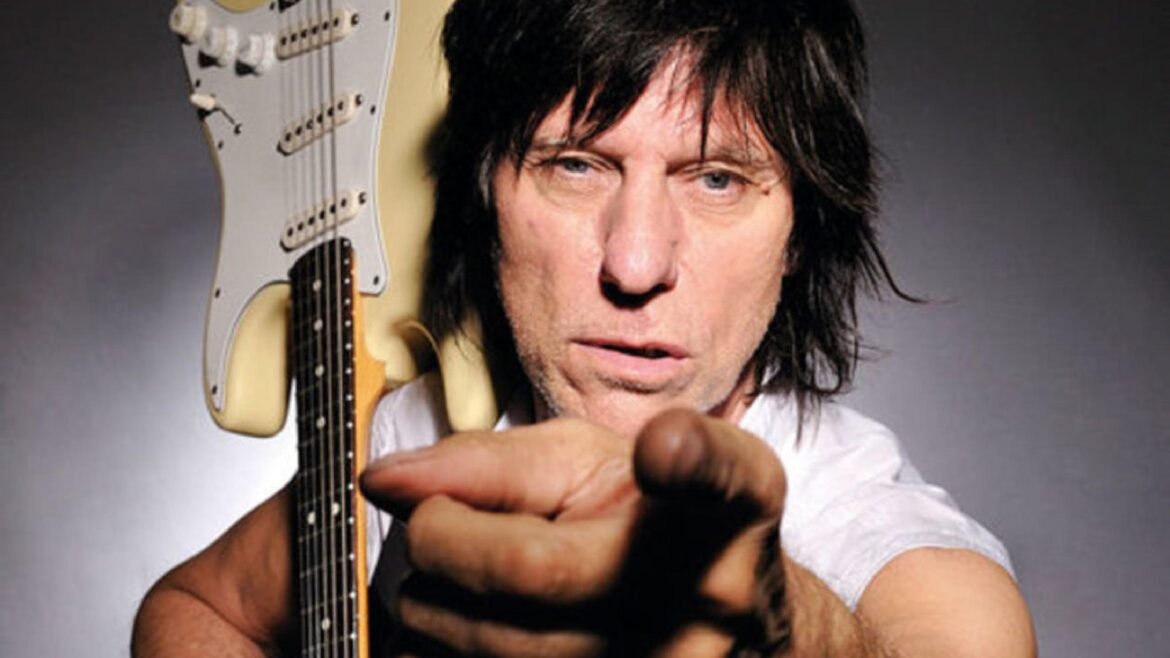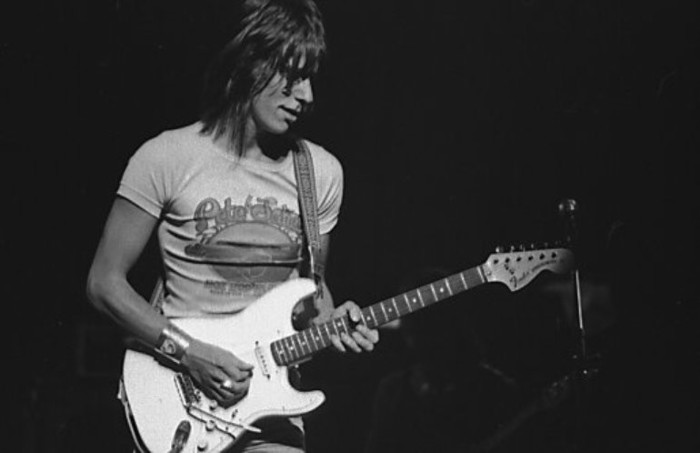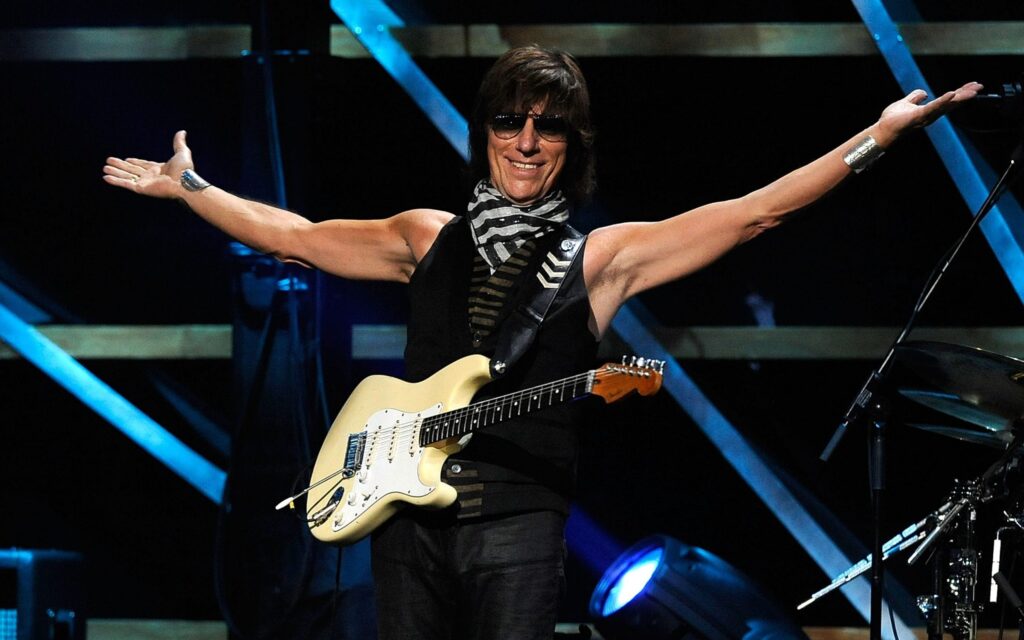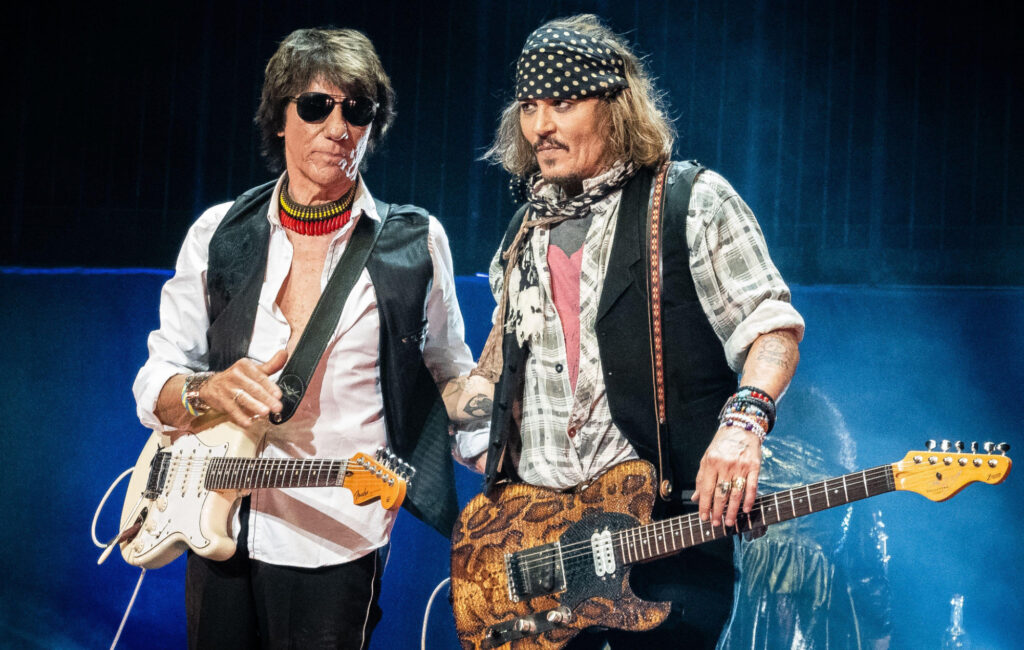
Geoffrey Arnold Beck (June 24, 1944 – January 10, 2023) was an English rock guitarist, known as Jeff Beck, who rose to fame with the Yardbirds and afterwards fronted the Jeff Beck Group and Beck, Bogert & Appice.
Jeff Beck was often called a “guitarist’s guitarist”, and ranked in the top five of Rolling Stone magazines’ list of 100 greatest guitarists, and they described him as “one of the most influential lead guitarists in rock”.
Jeff Beck earned wide critical praise and received the Grammy Award for Best Rock Instrumental Performance six times and Best Pop Instrumental Performance once. In 2014, he received the British Academy’s Ivor Novello Award for Outstanding Contribution to British Music. He was inducted into the Rock and Roll Hall of Fame twice, firstly in 1992 as a member of the Yardbirds and then in 2009 as a solo artist.
Geoffrey Arnold Beck was born in London, England on June 24, 1944 to Arnold and Ethel Beck.
Jeff Beck cited Les Paul as the first electric guitar player who impressed him and said that he first heard an electric guitar when he was six-years-old and heard Les Paul playing “How High the Moon” on the radio. He asked his mother what it was, and after she replied it was an electric guitar and was all tricks, he said, “That’s for me”.
As a teenager Jeff Beck learned to play on a borrowed guitar and made several attempts to build his own instrument. Jeff Beck’s sister Annetta introduced him to Jimmy Page when both were teenagers.
After leaving school, Jeff attended Wimbledon College of Art, and was then he briefly employed as a painter and decorator, a groundsman on a golf course, and a car paint sprayer.
While attending Wimbledon College of Art, Jeff Beck played in a succession of groups, including Screaming Lord Sutch and the Savages in 1962 when they recorded “Dracula’s Daughter”/”Come Back Baby” for Oriole Records.
In 1963, after Ian Stewart of The Rolling Stones introduced him to R&B, he formed the Nightshift with whom he played at the 100 Club in Oxford Street, and recorded a single, “Stormy Monday” backed with “That’s My Story”, for the Piccadilly label. Jeff Beck joined the Rumbles, a Croydon band, in 1963 for a short period as lead guitarist, playing Gene Vincent and Buddy Holly songs, displaying a talent for mimicking guitar styles. Later in 1963, he joined the Tridents, a band from the Chiswick area. “They were really my scene because they were playing flat-out R&B, like Jimmy Reed stuff, and we supercharged it all up and made it really rocky. I got off on that, even though it was only twelve-bar blues.”
In March 1965, after Eric Clapton left, Jeff Beck was recruited by the Yardbirds on the recommendation of Jimmy Page, who had been their initial choice. The Yardbirds recorded most of their Top 40 hit songs during Jeff Beck’s short but significant 20-month time with the band allowing him only one full album, which became known as Roger the Engineer (titled Over Under Sideways Down in the U.S.) which was released in 1966.
In May 1966, Jeff Beck recorded an instrumental titled “Beck’s Bolero” backed by Jimmy Page on 12-string rhythm guitar, Keith Moon, from The WHO, on drums, John Paul Jones, Led Zeppelin, on bass, and Nicky Hopkins on piano.
In June, Jimmy Page joined the Yardbirds, at first on bass and later as second lead guitar. This dual lead-guitar lineup was filmed performing an adaptation of “Train Kept A-Rollin'”, titled “Stroll On”, for the 1966 Michelangelo Antonioni film Blow Up.

Jeff Beck was fired by the Yardbirds during a U.S. tour for being a consistent no-show, as well as difficulties caused by his perfectionism and explosive temper.
In 1967, he recorded several solo singles for pop producer Mickie Most, including “Hi Ho Silver Lining” and “Tallyman”, which also included his vocals.
He then formed The Jeff Beck Group, which included Rod Stewart on vocals, Ronnie Wood on bass, Nicky Hopkins on piano, and Aynsley Dunbar on drums, later replaced by Micky Waller. The group produced two albums for Columbia Records (Epic in the United States), “Truth” (as Jeff Beck, August 1968) and “Beck-Ola” (July 1969). “Truth” was released five months before the first Led Zeppelin album, and featured “You Shook Me”, a song written by Willie Dixon and first recorded by Muddy Waters, which was also covered on the Led Zeppelin debut album with a very similar arrangement. “Truth” sold well, reaching Number 15 on the Billboard charts. “Beck-Ola” saw drummer Micky Waller replaced by Tony Newman, and, while well-received, was less successful both commercially and critically. Resentment, coupled with touring incidents, led the band to disband in July 1969.
In his autobiography Nick Mason recalls that during 1967 Pink Floyd had wanted to recruit Beck to be its guitarist after the departure of Syd Barrett but “none of us had the nerve to ask him.” In 1969, following the death of Brian Jones, Jeff Beck was approached about joining the Rolling Stones.
After the break-up of his band, Jeff Beck took part in the “Music from Free Creek” super session project recordings by “Free Creek”, a group composed of a number of internationally renowned musical artists of the time, including Jeff Beck, Eric Clapton, Keith Emerson, Buzz Feiten, Mitch Mitchell and Linda Ronstadt. Jeff Beck was billed as “A. N. Other” and contributed lead guitar on four songs, including one co-written by him.
In September 1969, Jeff Beck teamed with the rhythm section of Vanilla Fudge, bassist Tim Bogert and drummer Carmine Appice, when they were in England to resolve contractual issues, but when Jeff fractured his skull in a car accident in December the plan was postponed for two-and-a-half years, during which time Bogert and Appice formed Cactus.
In 1970, after Jeff Beck had regained his health, he formed a band with the legendary drummer Cozy Powell. Jeff Beck, Cozy Powell, and producer Mickie Most flew to the United States and recorded several tracks at Motown’s famed Studio A in Hitsville U.S.A. with The Funk Brothers, Motown’s in-house band, but the results remained unreleased.
By April 1971 Jeff Beck formed a new band with guitarist/vocalist Bobby Tench, keyboard player Max Middleton, and bassist Clive Chaman, and performed as “The Jeff Beck Group” but they had a substantially different sound from the first line-up. The first album they recorded, “Rough and Ready” (October 1971), on which Jeff Beck wrote or co-wrote six of the seven tracks, included elements of soul, rhythm-and-blues, and jazz, foreshadowing the direction Jeff Beck’s music would take later in the decade.
A second album “Jeff Beck Group” (July 1972) was recorded at TMI studios in Memphis with the same personnel, with Steve Cropper as producer and the album displayed a strong soul influence, five of the nine tracks being covers of songs by American artists, including “I Got to Have a Song”, by Stevie Wonder.
Jeff Beck then started collaborating with bassist Tim Bogert and drummer Carmine Appice, who became available following the demise of Cactus, but continued touring as the Jeff Beck Group in order to fulfill contractual obligations with his promoter. After the tour, the other members left the band and the power trio Beck, Bogert & Appice emerged. Appice took on the role of vocalist with Bogert and Beck contributing occasionally.
In April 1973 the album “Beck, Bogert & Appice” was released (on Epic Records) but while critics acknowledged the band’s instrumental prowess, the album was not commercially well received, except for its cover of Stevie Wonder’s classic “Superstition”.
On July 3, 1973 Jeff Beck joined David Bowie onstage to perform “The Jean Genie”/”Love Me Do” and “Around and Around.” The show was recorded and filmed, but none of the released editions included Beck.
Early in January 1974 Beck, Bogert & Appice played a concert at the Rainbow Theatre in London as part of a European tour which was broadcast in full on the U.S. show Rock Around the World in September of the same year. This last recorded work by the band previewed material intended for a second studio album, included on the bootleg “At Last Rainbow”. The tracks “Blues Deluxe” and “BBA Boogie” from this concert were later included on the Jeff Beck compilation “Beckology” in 1991.
Beck, Bogert & Appice split in April 1974 before their second studio album (produced by Jimmy Miller) was finished, and their live album “Beck, Bogert & Appice Live in Japan”, recorded during their 1973 tour of Japan, was not released until February 1975.
After a few months, Jeff Beck entered Underhill Studio and met with the band Upp and recruited them to be the backing band for his appearance on the BBC TV program Guitar Workshop in August 1974. Jeff Beck produced and played on their self-titled debut album and their second album “This Way Upp”, though his contributions to the second album went uncredited.
In October 1974 Jeff Beck began to record instrumentals at AIR Studios with Max Middleton, bassist Phil Chen, and drummer Richard Bailey using the legendary George Martin as producer and arranger.
Jeff Beck’s solo album “Blow by Blow”, which was released in March 1975, evolved from these sessions and showcased Beck’s technical prowess in jazz-rock. The album reached number four in the charts and is Jeff Beck’s most commercially successful release.
Jeff Beck put together a live band for a United States tour, which was preceded by a small and unannounced gig at The Newlands Tavern in Peckham, London, and toured through April and May 1975, mostly supporting the Mahavishnu Orchestra.
In a May 1975 show in Cleveland at the Music Hall, Jeff Beck became frustrated with an early version of a talk box he used on his arrangement of the Beatles’ “She’s a Woman”, and after breaking a string, tossed his legendary Yardbirds-era Fender Stratocaster guitar and the talk box off the stage, and finished the show playing a Les Paul guitar without the box.

Jeff Beck returned to the studio and recorded “Wired” in 1976, which paired ex-Mahavishnu Orchestra drummer and composer Narada Michael Walden and keyboardist Jan Hammer. The album used a jazz-rock fusion style, which sounded similar to the work of his two collaborators. To promote the album, Beck joined forces with the Jan Hammer Group, playing a show supporting Alvin Lee at The Roundhouse in May 1976, before embarking on a seven-month-long world tour. This resulted in the live album “Jeff Beck with the Jan Hammer Group Live” which was released in 1977.
At this point Jeff Beck was a tax exile and took up residency in the U.S., remaining there until his return to the U.K. in the autumn of 1977. In the spring of 1978, he began rehearsing with ex-Return to Forever bassist Stanley Clarke and drummer Gerry Brown towards a projected appearance at the Knebworth Festival, but this was cancelled after Brown dropped out.
Work then began on a new studio album at the Who’s Ramport Studios in London and continued sporadically throughout 1979, resulting in “There & Back” in June 1980. It featured three tracks composed and recorded with Jan Hammer. Stanley Clarke was replaced by Mo Foster on bass, both on the album and the subsequent extensive tours in the United States, Japan, and the United Kingdom.
In 1981 Jeff Beck made a series of historic live appearances with his Yardbirds predecessor Eric Clapton at the Amnesty International-sponsored benefit concerts dubbed “The Secret Policeman’s Other Ball” shows. He appeared with Clapton on “Crossroads”, “Further on up the Road”, and his arrangement of Stevie Wonder’s “Cause We’ve Ended As Lovers”. Beck also featured prominently in an all-star band finale performance of “I Shall Be Released” with Eric Clapton, Sting, Phil Collins, Donovan, and Bob Geldof. Beck’s contributions were seen and heard in the resulting album and film, both of which achieved worldwide success in 1982.
Another benefit show, the ARMS Concert for multiple sclerosis featured a jam with Jeff Beck, Eric Clapton and Jimmy Page performing “Tulsa Time” and “Layla”.
In 1985 Beck released “Flash”, featuring a variety of vocalists, but most notably former bandmate Rod Stewart on a rendition of Curtis Mayfield’s “People Get Ready” which was also released as a single and went on to become a hit. A video was made for the track and the clip achieved heavy rotation on MTV. The two also played a few dates together during this time but a full tour in tandem never materialized. At Rod Stewart’s induction to the Rock and Roll Hall of Fame in 1992, Beck gave the induction speech saying of Stewart, “We have a love hate relationship, he loves me and I hate him.”
During the 1980s, Beck made several guest appearances with other performers, including one in the 1988 movie Twins, where he played guitar with singer Nicolette Larson.
After a four-year break Jeff made a return to instrumental music with the 1989 album “Jeff Beck’s Guitar Shop”, the first album to feature Beck as a fingerstyle guitarist, leaving the plectrum playing style. It was only his third album to be released in the 1980s. Much of Beck’s sparse and sporadic recording schedule was due in part to a long battle with tinnitus.
Jeff Beck contributed to Jon Bon Jovi’s solo debut album “Blaze of Glory” in 1990, playing the main solo of the album’s title song, which was also the theme song to the movie Young Guns II. The same year, he was a featured performer on Hans Zimmer’s score for the film “Days of Thunder”.
He played lead guitar on Roger Waters’ 1992 concept album “Amused to Death”, and on the 1993 albums “The Red Shoes” by Kate Bush and “Love Scenes” by Beverley Craven. He recorded the 1992 instrumental soundtrack album “Frankie’s House”, as well as “Crazy Legs” in 1993, a tribute album to 1950s rockabilly group Gene Vincent and the Blue Caps and their influential guitarist Cliff Gallup.
Jeff Beck rehearsed with Guns N’ Roses for their concert in Paris in 1992, but did not play in the actual concert due to a cymbal crash by a Matt Sorum, causing him to become temporarily deaf.
He accompanied Paul Rodgers of Bad Company on the album “Muddy Water Blues: A Tribute to Muddy Waters” in 1993.
Jeff Beck’s next release was in 1999, his first foray into guitar-based electronica, “Who Else!”. The album was Beck’s first collaboration with a female musician, Jennifer Batten, in touring, writing, and recording as well as the first time he had worked with another guitarist on his own material since playing in the Yardbirds.
In 2000, Jeff Beck won his third Grammy Award, this one for ‘Best Rock Instrumental Performance’ for the track “Dirty Mind” from the album “You Had It Coming”.
The song “Plan B” from the 2003 release “Jeff”, earned Beck his fourth Grammy Award for Best Rock Instrumental Performance, and was proof that the new electro-guitar style he used for the two earlier albums would continue to dominate. Beck was the opening act for B.B. King in the summer of 2003 and appeared at Eric Clapton’s Crossroads Guitar Festival in 2004. Additionally, in 2004, Beck was featured on the song “54-46 Was My Number” by Toots and the Maytals as part of the album “True Love” which won the Grammy Award for Best Reggae Album.
In 2007, Jeff Beck accompanied Kelly Clarkson for her cover of Patty Griffin’s “Up to the Mountain”, during the Idol Gives Back episode of American Idol. The performance was recorded live and afterward, was immediately released for sale. In the same year, he appeared once again at Clapton’s Crossroads Guitar Festival.
Beck played on the song “Black Cloud” on the 2009 Morrissey album “Years of Refusal” and later that year, Harvey Goldsmith became Beck’s manager.
Jeff Beck was inducted into the Rock and Roll Hall of Fame on April 4, 2009, as a solo artist. The award was presented by Jimmy Page, and Beck performed “Train Kept A-Rollin'” along with Page, Ronnie Wood, Joe Perry, Flea, and Metallica members James Hetfield, Robert Trujillo, Lars Ulrich, Kirk Hammett, and Jason Newsted.
On 4 July 2009, David Gilmour joined Beck onstage at the Albert Hall and they traded solos on “Jerusalem” and “Hi Ho Silver Lining”.
Beck’s next album, “Emotion & Commotion”, was released in April 2010 with Joss Stone and Imelda May providing some of the guest vocals, and features a mixture of original songs and covers such as “Over the Rainbow” and “Nessun Dorma”. Two tracks from the album “Emotion & Commotion” won Grammy Awards in 2011, “Nessun Dorma” for Best Pop Instrumental Performance, and “Hammerhead” for Best Rock Instrumental Performance.
Jeff Beck also collaborated on “Imagine” for the 2010 Herbie Hancock album, “The Imagine Project” along with Seal, P!nk, India Arie, Konono N°1, Oumou Sangare and others and received a third Grammy in 2011 for Best Pop Collaboration with Vocals for the track.
Beck’s 2010 World Tour band featured Grammy-winning musician Narada Michael Walden on drums, Rhonda Smith on bass, and Jason Rebello on keyboards. He released a live album titled “Live and Exclusive from the Grammy Museum” on 25 October 2010.
In 2011, Beck received two honorary degrees from British universities, a fellowship from University of the Arts London in recognition of his “outstanding contribution to the field of Music” and an honorary doctorate from University of Sussex, stating the honour acknowledged “an outstanding musical career and celebrated the relationship between the university and the Brighton Institute of Modern Music (BIMM)”.
In 2013, it was announced that Jeff Beck would be performing on Beach Boys founder Brian Wilson’s solo album, alongside Beach Boys Al Jardine and David Marks. Beck also accompanied Wilson, Jardine and Marks on an eighteen date fall 2013 tour.
On April 5, 2014, to mark the beginning of Jeff’s World Tour in Japan, a three-track CD titled “Yosogai”, and in November 2014 Beck accompanied Joss Stone at The Royal British Legion’s Festival of Remembrance at the Royal Albert Hall.
He released the album “Loud Hailer” in 2016
On April 16, 2020, Jeff Beck released a new single, in which he collaborated with Johnny Depp to cover John Lennon’s song “Isolation”, explaining that this was a first record release from an ongoing musical collaboration between the two men. They had been recording music together for some time, with the track being produced the year before, but Beck explained that the decision to release it was influenced by the COVID-19 pandemic lockdowns: “We weren’t expecting to release it so soon but given all the hard days and true ‘isolation’ that people are going through in these challenging times, we decided now might be the right time to let you all hear it”.

On June 2, 2022, Beck appeared in the news after Johnny Depp appeared with him at The Sage in Gateshead, following his victory in the high-profile defamation case against his ex-wife Amber Heard, they had also performed together earlier that week at the Royal Albert Hall in London. Beck and Depp’s first single from their collaborative album “18”, titled “This Is a Song for Miss Hedy Lamarr”, was announced on June 10, 2022.
Jeff Beck also featured on two tracks from Ozzy Osbourne’s album released on June 24 2022, the title track “Patient Number 9” and “A Thousand Shades”.
Described by Rolling Stone magazine as “one of the most influential lead guitarists in rock”, Beck cited his major influences as Les Paul, the Shadows, Cliff Gallup, Ravi Shankar, Roy Buchanan, Chet Atkins, Django Reinhardt, Steve Cropper and Lonnie Mack. Beck said John McLaughlin “has given us so many different facets of the guitar and introduced thousands of us to world music, by blending Indian music with jazz and classical. I’d say he was the best guitarist alive.”
Jeff Beck died from bacterial meningitis on January 10, 2023, at the age of 78.


Pingback: Vanilla Fudge Bassist Tim Bogert died January 13, 2021 - Dead Musicians
Pingback: Reggae Legend Bunny Wailer died March 2, 2021 - Dead Musicians
Pingback: Beach Boy Jeffrey Foskett died December 11, 2023. - Dead Musicians